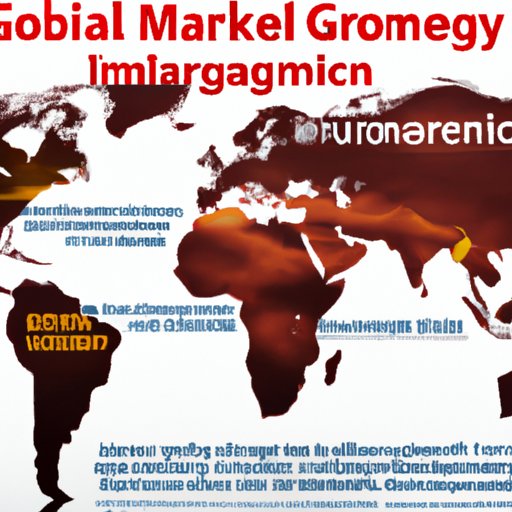Introduction
Global marketing strategies refer to a company’s approach to selling products or services in multiple markets worldwide. Companies that implement global marketing strategies seek to optimize their reach, reduce costs, and target specific markets. While it has many advantages, there are also certain challenges associated with it. In this article, we will explore the benefits, challenges, and role of technology in crafting global marketing strategies, as well as evaluating their impact on business performance.

Exploring Benefits of Global Marketing Strategies
One of the key benefits of global marketing strategies is increased reach. A company is no longer limited to selling its products or services in only one market. By expanding into multiple markets, they can increase sales and profits significantly. According to a study by McKinsey & Company, companies that implemented global marketing strategies achieved a 20-35% increase in revenue compared to those who did not.
In addition to increased reach, global marketing strategies also offer cost savings. By targeting multiple markets, companies can benefit from economies of scale, resulting in lower production costs. They can also take advantage of lower labor costs in certain countries, as well as cheaper shipping and logistics costs. All of these factors contribute to the overall cost savings that can be realized through global marketing strategies.
Finally, global marketing strategies give companies the ability to target specific markets. Companies can tailor their products and services to meet the needs of different markets, allowing them to capitalize on opportunities in each region. For example, a company may decide to focus on developing markets like India or China, where there is greater potential for growth.

Analyzing Examples of Effective Global Marketing Strategies
McDonalds is a good example of a company that has successfully implemented global marketing strategies. The fast food giant has over 36,000 restaurants in over 100 countries, making it one of the world’s most recognizable brands. McDonalds has tailored its menu to appeal to local tastes in different markets, offering items such as the McRice Burger in Asia and the Maharaja Mac in India. This strategy has enabled the company to expand rapidly and become a global powerhouse.
Apple is another company that has used global marketing strategies to great effect. The tech giant has stores in over 20 countries, allowing it to tap into new markets and grow its customer base. Apple has also tailored its products to suit local tastes, releasing special editions of its iPhones and iPads in some countries. This strategy has enabled the company to remain at the forefront of the tech industry.
Coca-Cola is yet another example of a company that has used global marketing strategies to drive growth. The beverage giant has over 500 brands sold in over 200 countries, making it one of the most recognizable brands in the world. Coca-Cola has adapted its products to suit local tastes, launching new flavors such as Fanta Mango in India and Fanta Green Apple in Japan. This has helped the company maintain its position as the leader in the soft drink market.

Examining Challenges Faced by Companies Implementing Global Marketing Strategies
Despite the many benefits of global marketing strategies, there are certain challenges that companies must overcome. One of the major challenges is cultural differences. Every country has its own unique culture and customs, which can make it difficult for companies to effectively communicate their message. Companies must be aware of cultural norms and adjust their messaging accordingly.
Another challenge is language barriers. Companies must be able to communicate their message clearly in the language of each market they are targeting. This can be difficult, as translating messages accurately is not always easy. Companies must ensure that they have the resources to properly translate their messages into multiple languages.
Finally, companies must also be aware of different regulations in each market they are targeting. Different countries have different laws and regulations that companies must adhere to. Companies must research the laws of each market they are targeting and adjust their strategies accordingly.
Understanding the Role of Technology in Crafting Global Marketing Strategies
Technology plays an important role in crafting global marketing strategies. Automation of processes can help companies streamline their operations, enabling them to quickly adjust their strategies to changing markets. Technology can also be used to create more effective online advertising campaigns, allowing companies to reach a larger audience.
Social media is another powerful tool for companies implementing global marketing strategies. Social media platforms such as Facebook and Twitter allow companies to engage directly with customers in each market. This gives them the opportunity to build relationships with customers, as well as gain valuable insights into customer preferences.
Evaluating the Impact of Global Marketing Strategies on Business Performance
The implementation of global marketing strategies can have a significant impact on business performance. Studies have shown that companies that adopt global marketing strategies are more likely to see an increase in profitability. This is due to the increased reach and cost savings that come with global marketing strategies.
Global marketing strategies can also lead to improved brand recognition. By expanding into multiple markets, companies can increase their visibility and reach new audiences. This can result in an increased customer base, as well as higher brand loyalty.
Finally, global marketing strategies can give companies greater insight into customer behavior. By engaging with customers in multiple markets, companies can gain a better understanding of customer preferences and needs. This information can then be used to craft more effective marketing strategies.
Conclusion
Global marketing strategies can offer companies many advantages, including increased reach, cost savings, and the ability to target specific markets. However, there are also certain challenges associated with it, such as cultural differences, language barriers, and different regulations. Technology plays an important role in crafting global marketing strategies, and can help companies streamline their operations and engage with customers. Finally, global marketing strategies can have a positive impact on business performance, leading to increased profitability, improved brand recognition, and greater customer insight.
(Note: Is this article not meeting your expectations? Do you have knowledge or insights to share? Unlock new opportunities and expand your reach by joining our authors team. Click Registration to join us and share your expertise with our readers.)
